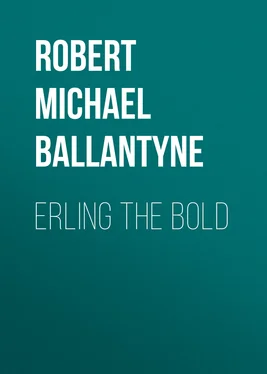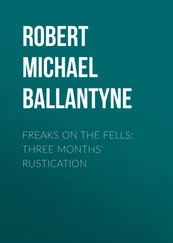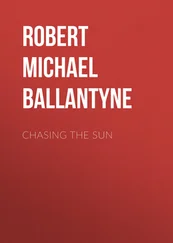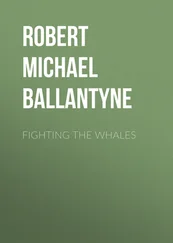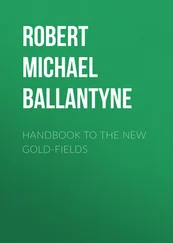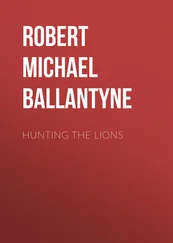Robert Michael Ballantyne - Erling the Bold
Здесь есть возможность читать онлайн «Robert Michael Ballantyne - Erling the Bold» — ознакомительный отрывок электронной книги совершенно бесплатно, а после прочтения отрывка купить полную версию. В некоторых случаях можно слушать аудио, скачать через торрент в формате fb2 и присутствует краткое содержание. Жанр: Детские приключения, literature_19, foreign_antique, foreign_prose, foreign_children, на английском языке. Описание произведения, (предисловие) а так же отзывы посетителей доступны на портале библиотеки ЛибКат.
- Название:Erling the Bold
- Автор:
- Жанр:
- Год:неизвестен
- ISBN:нет данных
- Рейтинг книги:4 / 5. Голосов: 1
-
Избранное:Добавить в избранное
- Отзывы:
-
Ваша оценка:
- 80
- 1
- 2
- 3
- 4
- 5
Erling the Bold: краткое содержание, описание и аннотация
Предлагаем к чтению аннотацию, описание, краткое содержание или предисловие (зависит от того, что написал сам автор книги «Erling the Bold»). Если вы не нашли необходимую информацию о книге — напишите в комментариях, мы постараемся отыскать её.
Erling the Bold — читать онлайн ознакомительный отрывок
Ниже представлен текст книги, разбитый по страницам. Система сохранения места последней прочитанной страницы, позволяет с удобством читать онлайн бесплатно книгу «Erling the Bold», без необходимости каждый раз заново искать на чём Вы остановились. Поставьте закладку, и сможете в любой момент перейти на страницу, на которой закончили чтение.
Интервал:
Закладка:
“How many men hast thou assembled, Thorer?” asked Erling as he donned his armour.
“Seventy-five, master; the rest are up on the fells, on what errand I know not.”
“Seventy-five will do. Haste thee, carle, and lead them to my longship the Swan. Methinks we will skate upon the ocean to-night. (Longships, or war-vessels, were sometimes called ocean-skates.) I will follow thee. Let every man be at his post, and quit not the shore till I come on board. Now fare away as swiftly as may be, and see that everything be done stealthily; above all, keep well out of sight of Ulfstede.”
Thus admonished, Thorer quickly left the forge; and a few seconds later the clanking tread of armed men was heard as Erling’s followers took their way to the fiord.
“Now I will to the hall, my son, and pray that thou mayst fare well,” said Herfrida, once more kissing the forehead which the youth lowered to receive the parting salute. The mother retired, and left her son standing in the forge gazing pensively at the fire, the dying flames of which shot up fitfully now and then, and gleamed on his shining mail.
If Erling the Bold was a splendid specimen of a man in his ordinary costume, when clad in the full panoply of war he was truly magnificent. The rude but not ungraceful armour of the period was admirably fitted to display to advantage the elegant proportions of his gigantic figure. A shirt or tunic of leather, covered with steel rings, hung loosely—yet, owing to its weight, closely—on his shoulders. This was gathered in at the waist by a broad leathern belt, studded with silver ornaments, from which hung a short dagger. A cross belt of somewhat similar make hung from his right shoulder, and supported a two-edged sword of immense weight, which was quite as strong, though not nearly so long, as that which he had forged for Glumm. It was intended for a single-handed weapon, though men of smaller size might have been constrained, in attempting to wield it, to make use of both hands. The youth’s lower limbs were clothed in closely-fitting leather leggings, and a pair of untanned leather shoes, laced with a single thong, protected his feet. On his head he wore a small skull-cap, or helmet, of burnished steel, from the top of which rose a pair of hawk’s wings expanded, as if in the act of flight. No gloves or gauntlets covered his hands, but on his left arm hung a large shield, shaped somewhat like an elongated heart, with a sharp point at its lower end. Its top touched his shoulder, and the lower part reached to his knee.
This shield was made of several plies of thick bull-hide, with an outer coat of iron—the whole being riveted firmly together with iron studs. It was painted pure white, without device of any kind, but there was a band of azure blue round it, near the margin—the rim itself being of polished steel. In addition to his enormous axe, sword, and dagger, Erling carried at his back a short bow and a quiver full of arrows.
The whole of this war gear bore evidence of being cherished with the utmost care and solicitude. Every ring on the tunic was polished as highly as the metal would admit of, so that the light appeared to trickle over it as its wearer moved. The helmet shone like a globe of quicksilver, and lines of light gleamed on the burnished edge of the shield, or sparkled on the ornamental points of the more precious metals with which the various parts of his armour were decorated. Above all hung a loose mantle or cloak of dark-blue cloth, which was fastened on the right shoulder with a large circular brooch of silver.
The weight of this panoply was enormous, but long habit had so inured the young Norseman to the burthen of his armour that he moved under it as lightly as if it had been no heavier than his ordinary habiliments. Indeed, so little did it impede his movements that he could spring over chasms and mountain streams almost as well with as without it; and it was one of the boasts of his admiring friends that “he could leap his own height with all his war gear on!”
We have already referred to Erling’s partiality for the axe as an offensive weapon. This preference was in truth—strange though the assertion may appear—owing to the peculiar adaptation of that instrument to the preservation of life as well as the taking of it!
There are exceptions to all rules. The rule among the Northmen in former years was to slay and spare not. Erling’s tendency, and occasionally his practice, was to spare and not to slay, if he could do so with propriety. From experience he found that, by a slight motion of his wrist, the edge of his axe could be turned aside, and the blow which was delivered by its flat side was invariably sufficient, without killing, to render the recipient utterly incapable of continuing or renewing the combat—at least for a few days. With the sword this delicate manoeuvre could not be so easily accomplished, for a blow from the flat of a sword was not sufficiently crushing, and if delivered with great force the weapon was apt to break. Besides, Erling was a blunt, downright, straightforward man, and it harmonised more with his feelings, and the energy of his character, to beat down sword and shield and headpiece with one tremendous blow, than to waste time in fencing with a lighter weapon.
Having completed his toilet and concluded his meditations—which latter filled him with much perplexity, if one might judge from the frequency with which he shook his head—Erling the Bold hung Glumm’s long sword at his back, laid his huge axe on his shoulder, and, emerging from the smithy, strode rapidly along the bridle path that led to the residence of Ulf of Romsdal.
Suddenly it occurred to him that he had not yet tried the temper of his new weapon, so he stopped abruptly before a small pine tree, about as thick as a man’s arm. It stood on the edge of a precipice along the margin of which the track skirted. Swaying the axe once round his head, he brought it forcibly down on the stem, through which it passed as if it had been a willow wand, and the tree went crashing into the ravine below. The youth looked earnestly at his weapon, and nodded his head once or twice as if the result were satisfactory. A benignant smile played on his countenance as he replaced it on his shoulder and continued on his way.
A brisk walk of half an hour brought him to Ulfstede, where he found the men of the family making active preparations for the impending journey to the Thing. In the great hall of the house, his father held earnest discussion with Ulf. The house-carles busied themselves in burnishing their mail and sharpening their weapons, while Ada and Hilda assisted Dame Astrid, Ulf’s wife, to spread the board for the evening meal.
Everything in the hall was suggestive of rude wealth and barbarous warlike times. The hall itself was unusually large—capable of feasting at least two hundred men. At one end a raised hearth sustained a fire of wood that was large enough to have roasted an ox. The smoke from this, in default of a chimney, found an exit through a hole in the roof. The rafters were, of course, smoked to a deep rich coffee colour, and from the same cause the walls also partook not a little of that hue. All round these walls hung, in great profusion, shields, spears, swords, bows, skins, horns, and such like implements and trophies of war and the chase. The centre of the hall was open, but down each side ran two long tables, which were at this time groaning with great haunches of venison, legs of mutton, and trenchers of salmon, interspersed with platters of wild fowl, and flanked by tankards and horns of mead and ale. Most of the drinking cups were of horn, but many of these were edged with a rim of silver, and, opposite the raised seats of honour, in the centre of each table, the tankards were of solid silver, richly though rudely chased—square, sturdy, and massive, like the stout warriors who were wont to quaff their foaming contents.
Читать дальшеИнтервал:
Закладка:
Похожие книги на «Erling the Bold»
Представляем Вашему вниманию похожие книги на «Erling the Bold» списком для выбора. Мы отобрали схожую по названию и смыслу литературу в надежде предоставить читателям больше вариантов отыскать новые, интересные, ещё непрочитанные произведения.
Обсуждение, отзывы о книге «Erling the Bold» и просто собственные мнения читателей. Оставьте ваши комментарии, напишите, что Вы думаете о произведении, его смысле или главных героях. Укажите что конкретно понравилось, а что нет, и почему Вы так считаете.
